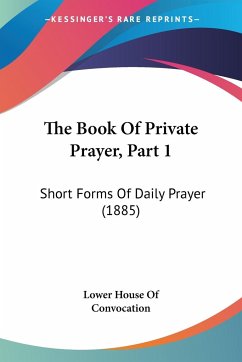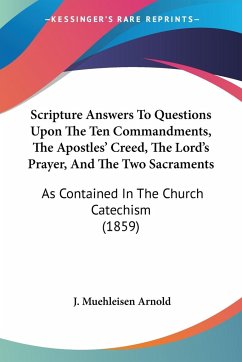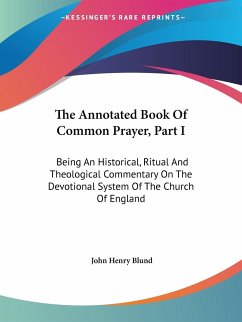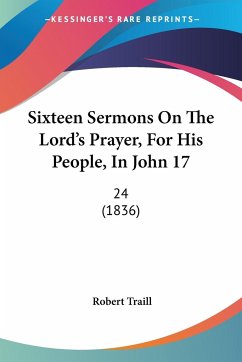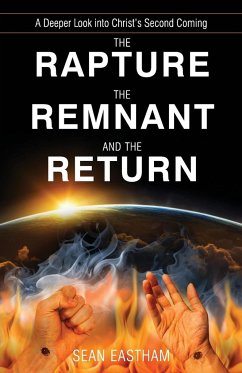
Prayer, Return of Prayer and the Saint's Jewel
Versandkostenfrei!
Versandfertig in 1-2 Wochen
10,99 €
inkl. MwSt.

PAYBACK Punkte
5 °P sammeln!
Prayer is an ordinance of God, and that to be used both in public and private; yea, such an ordinance will bring those that have the spirit of supplication into great familiarity with God; and is also so prevalent an action, that it gets of God, both for the person that prays, and for them that are prayed for, great things. It is the opener of the heart of God, and a means by which the soul, though empty, is filled. By prayer the Christian can open his heart to God, as to a friend and obtain fresh testimony of God's friendship to him - I might spend many words in distinguishing between public ...
Prayer is an ordinance of God, and that to be used both in public and private; yea, such an ordinance will bring those that have the spirit of supplication into great familiarity with God; and is also so prevalent an action, that it gets of God, both for the person that prays, and for them that are prayed for, great things. It is the opener of the heart of God, and a means by which the soul, though empty, is filled. By prayer the Christian can open his heart to God, as to a friend and obtain fresh testimony of God's friendship to him - I might spend many words in distinguishing between public and private prayer as also between that in the heart, and that with the vocal voice. Something also might be spoken to distinguish between the gifts and graces of prayer; but as eschewing this method my business shall be at this time only to show you the very heart of prayer, without which, all your lifting up both of hands, and eyes, and voices, will be to no purpose at all. Prayer is a sincere, sensible, affectionate pouring out of the heart or soul to God, through Christ, in the strength and assistance of the Holy Spirit, for such things as God has promised, or according to the Word for the good of the Church, with submission, in faith, to the will of God. 1. For the first of these: it is a sincere pouring out of the soul to God. Sincerity is such a grace as runs through all the graces of God in us, and through all the actings of a Christian, and has the sway in them too, or else their actings are not anything regarded of God, and so of and in prayer, of which particularly David speaks, when he mentions prayer: "7 cried unto the Lord with my mouth, and He was extolled with my tongue. If I regard iniquity in my heart, the Lord will not hear me " (Psa. 68:18). Part of the exercise of prayer is sincerity, without which God looks not upon it as prayer in a good sense. "And ye shall seek Me, and find Me, when ye shall search for Me with all your heart" (Jer. 29:13). The want of this made the Lord reject their prayers in Hos. 7:14, where He says, "They have not cried to Me with their hearts (that is, in sincerity), when they howled upon their beds "! But for a pretense, for a show, in hypocrisy, to be seen of men, and applauded for the same, they pray. Sincerity was that which Christ commended in Nathaniel when he was under the fig-tree: "Behold an Israelite indeed, in whom is no guile" (John 1:47). Probably this good man was pouring out of his soul to God in prayer under the fig-tree, and that in a sincere and unfeigned spirit before the Lord. The prayer that has this in it as one of the principal ingredients is the prayer that God looks at: "The prayer of the upright is His delight. " Bunyan (1628-1688) rose from an humble beginning to being a preacher to a little house church, to 12 years in jail because he would not agree to quit preaching, to a huge church in London. He wrote 66 books, nearly all while in jail. Goodwin (1600-1679) was rightly described as ''one of the twin pillars of the Puritan movement.'' His 12 volumes are filled with information not to be found in any other works. Thomas Shepard was an early New England Puritan. His work was praised at once by eminent divines, four of them being Westminster Confession participants. Jonathan Edwards quoted from Shepard more than any other.



